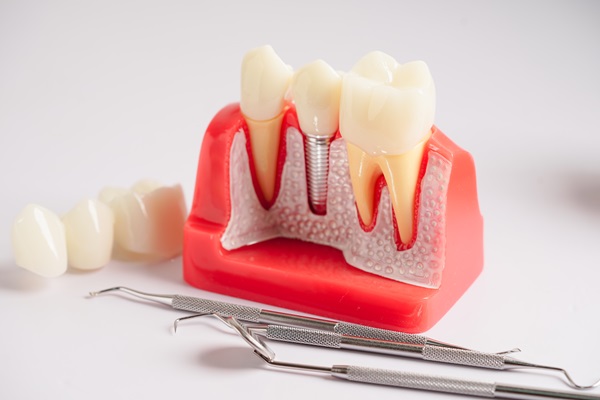4 Simple Steps to Place Dental Implants

One of the leading tooth replacement choices dentists and patients are opting for is dental implants. When it comes to tooth replacement, evaluating the different options can sometimes seem overwhelming. However, with dental technology becoming more advanced and available for people with one or more missing teeth, there is an option for almost everyone. This article takes a closer look at replacing missing teeth with dental implants. This article will examine the steps to getting dental implants from start to finish.
What are the steps to get dental implants?
Once a patient and their dentist come to the consensus that dental implants are the best solution to restore a tooth or missing teeth, they will proceed with the following:
Step 1: Talk to your dentist
Staying in communication with your dentist during the dental implant process is crucial. Keeping this open communication with your dentist after the placement is also important. If any issues arise, always let your dentist know. Ensure you understand all the steps of the process, what you are committing to, and how to care for yourself during the process.
Step 2: Make sure the jawbone is strong enough
The most important thing to remember with dental implants is that the dentist must ensure the jaw bone is strong enough to receive and securely hold an implant post. If the bone is not strong enough, the dentist will suggest a bone graft to ready the jaw for the implant process. This can add months to the process. However, it is an option for patients who have suffered jawbone loss.
Step 3: Insert implant post
Inserting the screw-like metal post into the jaw bone is a simple process if the jaw is strong enough. After inserting the post, there is a waiting period before the final part of the dental implant process. The post must then integrate with the patient's jawbone through osseointegration. This process typically takes about three months and involves the jawbone fusing with the dental implant.
Step 4: Dental crown
The dentist will ensure the crown is a good fit and that no adjustments are necessary. The practitioner will also ensure it is the right shade to match the surrounding teeth and does not rub or cause any issues for the teeth next to the crown, cheeks, or gums. If there are issues, the dentist may order a replacement crown that is a better fit. Once the dentist has ensured these areas of the teeth and mouth are not problematic, they will fasten it on top of the abutment, and the patient will be on their way.
Who is a good candidate for dental implants
In addition to having adequate jawbone density, candidates must be in good oral health. The dentist will advise patients to take care of any oral health issues before starting this process. Patients will also need to be healthy enough for implant surgery. Because smoking is so harmful to the healing process, patients who get dental implants are advised to quit before the procedure.
The dental implant process can take months and involve multiple procedures. It is important the patient is willing to commit to the process. In addition to being ready for the process, patients need to be aware that dental care never stops being important. Even if all the teeth are replaced with dental implants, the patient will still need to brush, floss, and attend regular dental visits. Though the crown, bridge, or denture will need replacing at some point, the implant posts can last a lifetime with proper care.
Dental implants start at your general dentist
The patient must follow up with the dental professional after the procedure. Then, the dentist must ensure the implant is fusing with the jaw correctly. There is a small chance the body could reject the implant. Therefore, a follow-up a few months later so the dentist can check the progress of the implant is key.
A dental implant can last up to 40 years with proper care and necessary check-up appointments with a dentist. It changes people's lives for the better, giving people renewed confidence in their smiles. Talk with our dental professional today to see how you can start the process to a better, happier smile.
Restore your smile with dental implants
Are you ready to find out more about dental implants and how simple it can be to get the smile you have always wanted? Give us a call today!
Request an appointment here: https://www.smilebeautification.com or call Precision Smiles. at (201) 204-1355 for an appointment in our Hackensack office.
Check out what others are saying about our dental services on Yelp: Dental Implants in Hackensack, NJ.
Recent Posts
Dental implants have always been the most stable restorations you could ever have. They are a level higher than traditional dentures or fixed bridges. Each implant mimics the basic structures of a natural tooth. It is stable on its own. Imagine what it would be like to have them replace your dental arches. If you…
Dental implants enable you to get as close as you can get to replacing your natural teeth roots, both in terms of function and health benefits. Dental implants require regular care like your natural teeth, which is the only way to ensure that your implant-supported teeth can last a lifetime. Read on to learn about…
Deciding to get dental implants can be nerve-racking and exciting at the same time. Knowing as much as you can about the procedure can help clear up any apprehension. These restorations are durable and lasting. Understanding what to do while talking and chewing will be helpful. If you want to learn some pointers about speaking…
A consistent oral hygiene routine is necessary for anyone who has dental implants. While tooth decay cannot affect implants themselves, the area still requires routine cleaning to prevent gum disease and even infection. Failure to do so can also cause staining of the prosthetic tooth and an unsightly appearance. If the tissues surrounding the implant…


